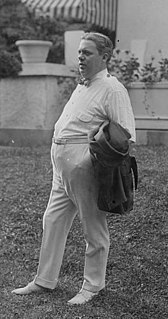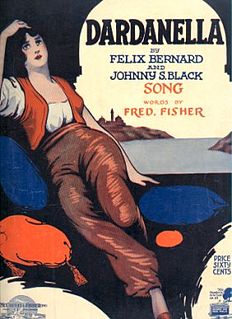"Something's Gotta Give" is a popular song with words and music by Johnny Mercer in 1954. It was published in 1955. It was written for and first performed by Fred Astaire in the 1955 musical film Daddy Long Legs, and was nominated for an Academy Award in 1955 as Best Original Song, losing to "Love is a Many Splendored Thing" from the film of the same name.
"On the Street Where You Live" is a song with music by Frederick Loewe and lyrics by Alan Jay Lerner from the 1956 Broadway musical My Fair Lady. It is sung in the musical by the character Freddy Eynsford-Hill, who was portrayed by John Michael King in the original production. In the 1964 film version, it was sung by Bill Shirley, dubbing for actor Jeremy Brett.

Henry Burr was a Canadian singer, radio performer and producer. He was born Harry Haley McClaskey and used Henry Burr as one of his many pseudonyms, in addition to Irving Gillette, Henry Gillette, Alfred Alexander, Robert Rice, Carl Ely, Harry Barr, Frank Knapp, Al King, and Shamus McClaskey. He produced more than 12,000 recordings, by his own estimate, and some of his most popular recordings included "Just a Baby's Prayer at Twilight", "Till We Meet Again" with Albert Campbell, "Beautiful Ohio", "I Wonder Who's Kissing Her Now" "When I Lost You" and "In The Shade Of The Old Apple Tree". A tenor, he performed as a soloist and in duets, trios and quartets.

Sam M. Lewis was an American singer and lyricist.

"The Way You Look Tonight" is a song from the film Swing Time that was performed by Fred Astaire and composed by Jerome Kern with lyrics written by Dorothy Fields. It won the Academy Award for Best Original Song in 1936. Fields remarked, "The first time Jerry played that melody for me I went out and started to cry. The release absolutely killed me. I couldn't stop, it was so beautiful."

"My Melancholy Baby" is a popular song published in 1912 and first sung publicly by William Frawley. The music was written by Ernie Burnett (1884–1959), the lyrics by George A. Norton.
"It's Easy to Remember " is a popular song written by Richard Rodgers with lyrics by Lorenz Hart, published in 1935, written for the 1935 film Mississippi starring Bing Crosby and W.C. Fields. Crosby introduced the song in the film and his recording for Decca Records made on February 21, 1935 with Georgie Stoll and his Orchestra and Rhythmettes and Three Shades of Blue topped the charts of the day. Crosby recorded the song again in 1954 for his album Bing: A Musical Autobiography.
"I've Got The World on a String" is a 1932 popular jazz song composed by Harold Arlen, with lyrics written by Ted Koehler. It was written for the twenty-first edition of the Cotton Club series which opened on October 23, 1932, the first of the Cotton Club Parades.

"Rock-a-Bye Your Baby with a Dixie Melody" is a popular song written by Jean Schwartz, with lyrics by Sam M. Lewis and Joe Young. The song was introduced by Al Jolson in the Broadway musical Sinbad and published in 1918.
"'S Wonderful" is a 1927 popular song composed by George Gershwin, with lyrics written by Ira Gershwin. It was introduced in the Broadway musical Funny Face (1927) by Adele Astaire and Allen Kearns.

"After You've Gone" is a 1918 popular song composed by Turner Layton with lyrics by Henry Creamer. It was recorded by Marion Harris on July 22, 1918, and released by Victor Records. The chorus adheres to a standard ABAC pattern but is only 20 measures long. There are four 4-bar phrases, followed by a 4 measure tag. The song is harmonically active, with chord changes almost every measure. The opening four notes are identical to the opening notes of Peg o' My Heart (1912)—at the time songwriters often borrowed the first few notes of a hit melody. The song was so popular that the sheet music was later decorated with tiny photographs of the 45 men who made the song famous, including Paul Whiteman, Rudy Vallée, B.A. Rolfe, Guy Lombardo, and Louis Armstrong.
"(You'd Be So) Easy to Love" is a popular song written by Cole Porter for William Gaxton to sing in the 1934 Broadway show Anything Goes. However Gaxton was unhappy about its wide vocal range and it was cut from the musical. Porter re-wrote it for the 1936 film Born to Dance, where it was introduced by Eleanor Powell, James Stewart, and Frances Langford under its alternate title, "Easy to Love". The song was only later added to the 1987 and 2011 revivals of Anything Goes under the complete title "You’d Be So Easy to Love".
"Memories" is a popular song with music by Egbert Van Alstyne and lyrics by Gus Kahn, published in 1915.

"Dardanella" is a popular song published in 1919 by Fred Fisher, who wrote the lyrics for the music written by Felix Bernard and Johnny S. Black.

"Out of Nowhere" is a popular song composed by Johnny Green with lyrics by Edward Heyman and published by Famous Music. It was popularized by Bing Crosby, and was the first recording under his Brunswick Records contract. He recorded it on March 30, 1931 and it became his first number one hit as a solo artist. Crosby also sang it in the film Confessions of a Co-Ed (1931) and in his short film I Surrender Dear (1931). He recorded it again in 1954 for his album Bing: A Musical Autobiography.

"I've Got My Captain Working for Me Now" is a popular song written in 1919 by Irving Berlin. It was published by Music Publishers Inc. in New York, New York.
"When the Red, Red Robin " was a 1926 popular song written, both words and music, by Harry Woods. The song became the signature song for singer and actress Lillian Roth, who performed it often during the height of her musical career from the late 1920s to the late 1930s.

Baby's Prayer Will Soon Be Answered is a 1918 song written during World War I and performed by Henry Burr. The music and lyrics were written by Billy Baskette and Van & Schenck, and it was published by Shapiro, Bernstein & Co. Based on the sales, it reached an approximate peak position of No.2 on the Top 100 US songs of its time.

Oh How I Wish I Could Sleep Until My Daddy Comes Home is a 1918 song written during World War I. It was performed by Henry Burr, with the music composed by Pete Wendling and the lyrics written by Sam M. Lewis and Joe Waterson. Based on sales estimates, the song hit a peak position of number three on the Top 100 US songs of its time.
Let's All Be Americans Now is a World War I song written and composed by Irving Berlin, Edgar Leslie, and George W. Meyer. The song was first published in 1917 by Waterson, Berlin & Snyder Co., in New York, NY.The sheet music cover depicts a soldier with his rifle and silhouetted marching soldiers in the background. A popular recording in 1917 was made by the American Quartet.










